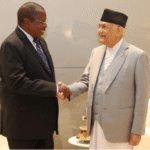By Emmanuel Sikena
Abuja, Nigeria – As US President Donald Trump’s reciprocal trade tariffs send ripples of economic uncertainty across the globe, Africa must prioritize strengthening its financial institutions to weather the storm. This was the key message delivered by Afreximbank Senior Vice-President Denys Denya at the opening of the bank’s 32nd annual general meeting in Abuja, Nigeria, on Wednesday, June 25, 2025.
Denya warned that the current geopolitical landscape, characterized by rising protectionism and trade tensions, necessitates a robust African financial sector capable of acting as a “shock absorber.” He emphasized that the continent has reached a critical juncture where collective action and unwavering resolve are paramount to addressing its challenges and shaping its future.
“This calls for strengthening African institutions, especially development finance institutions (DFIs), as they are critical for sustainable development, democratic governance, and improved livelihoods,” Denya stated. He highlighted the growing scarcity of funding for African entities and stressed the importance of supporting homegrown institutions to solve the continent’s unique problems.
Denya further underscored the need for strong political support to ensure the effectiveness and sustainability of these institutions. He advocated for “building strong, independent institutions, promoting good governance, and fostering regional cooperation” as vital steps towards a more resilient and prosperous Africa.
Beyond strengthening financial structures, Denya outlined several key strategies for navigating the turbulent global economy. These include:
- Prudent Policies and Reforms: Implementing sound macroeconomic management, structural reforms, and investing in essential areas such as infrastructure and human capital are crucial for fostering sustainable economic growth.
- Industrialization and Value Addition: Scaling up industrialization is essential to promote value addition to Africa’s exports and diversify the continent’s export basket.
- Diversifying Export Destinations: While increasing value addition, efforts should be focused on diversifying export destinations to mitigate reliance on specific markets.
- Leveraging the AfCFTA: Improving regional trade through the African Continental Free Trade Area (AfCFTA) is a unique opportunity to accelerate the structural transformation of the continent’s economies by expanding the manufacturing base. Despite intra-African trade hovering around just 16%, the AfCFTA offers the potential for significant growth in the sector.
The importance of regional trade was further emphasized by the latest African Trade Report, released on Wednesday, which revealed that Africa’s share of world exports declined to 3.3% last year from 3.5% in 2009. The report also showed that intra-African trade accounts for a paltry 14.4% of the region’s formal trade, highlighting the continued dependence on external demand and exposure to commodity shocks.
Denya concluded by advocating for forging new trading partners and strategic alliances to leverage “our collective strengths, resources, and expertise for shared prosperity.” He specifically highlighted the importance of South-South trade and investment promotion, stating that Afreximbank stands ready to support member states in advancing their short- and medium-term goals.
The message from the Afreximbank VP is clear: in an increasingly uncertain world, Africa must prioritize building strong, independent financial institutions and diversifying its economic activities to secure a sustainable and prosperous future.










